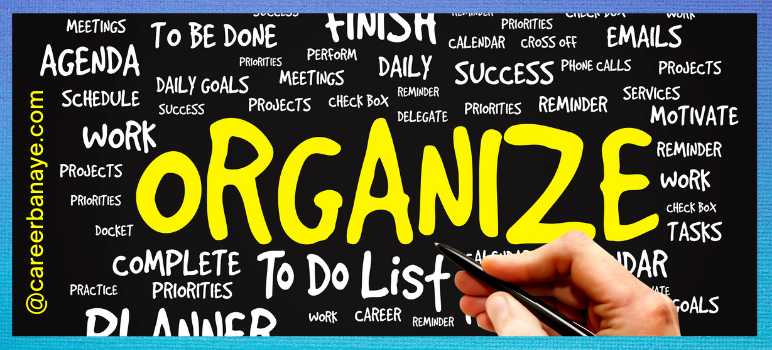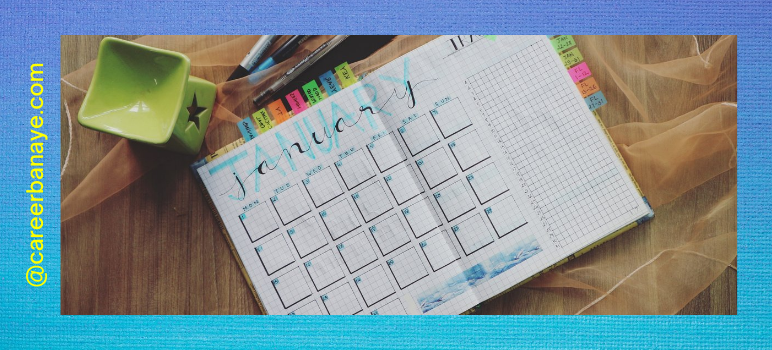How to organise yourself: I’ve considered it many times myself. I have no time for anything!
Having the feeling of always being in a rush, of not being able to deal, of being very busy… with numerous professional and personal responsibilities, but still feeling like you’re not moving forward, that you don’t get to do what you want, or that you do things that don’t help.

There may also be a sense of dispersion and overwhelm, as a result of starting several things and not finishing them, or of not knowing where to begin. I wish the day was 40 hours long! Have you ever experienced something similar?
Today I’d want to talk to you about time management and how to organise yourself.
How to organise yourself?
How to organise yourself is a very broad issue with numerous studies, methodologies, resources, and regions to consider. But first, I’d like to list some key concepts for improved time management and organization: It has to do with our habits, with learning and integrating good habits and eliminating bad ones that make us inefficient.
1. Organising is a talent that can be learned and improved.
Excuses such as “I’ve always been this way” or “it’s tough since I’m swamped with work” are not acceptable. The more things you have to accomplish, the more crucial it is to have a decent organization. You must have known folks who have a very busy schedule and manage to work extremely effectively, without stress and in a productive manner.
If you have more chores than you can handle in your daily routine, you are disorganizing your schedule. There may be an issue when it comes to saying no, estimating how long each task will take, taking on obligations that you could delegate or that are not yours, setting limits, or asking for help.
Also Read: 10 Ways on How to achieve great self-control!
2. Distinguish between the urgent and the important.
Do you recall the story about the stones and the flask? What are your major stumbling blocks? What are the most important or high-priority tasks? Family, health, friends, an enjoyable hobby, intellectual concerns…?
Many times, we are so preoccupied with urgent small things that we have no room for what is truly essential. We do a thousand things and feel as though we have accomplished nothing. Make a list of your “huge stones,” or the things in your life that are essential to you. Then, transform it into actual activities that you can do in your daily life.
3. Find a way how to organise yourself- Plan!
Yes, it may appear apparent, but it is not: planning is necessary. Make a written plan. Many times, we rely only on our minds for everything and do not seek outside help. It is the wrong way.

Do not overload your brain’s “RAM” with to-do lists; instead, utilize external resources such as applications, agendas, calendars, and so on, for both business and personal use. There are systems, such as GTD (Get Things Done), that can provide organizational principles, or you can develop your own: but learn to plan for the short, medium, and long term; no longer rely just on your “brain.”
Consider agendas, planners, lists, calendars, and so on. It may be challenging at first if you are not used to performing it, but you can learn and incorporate it into your daily routine.
There are several applications available, some of which I use, including Google Calendar, Trello, Evernote, and To-Do Notes.
4. Take careful note of everything! Put your thoughts in writing!
Both the day-to-day activities that you must perform, as well as your ideas, long-term projects, movies that you want to watch, places you would like to visit, books to read, personal ambitions, and so on.
For example, having a list of recommended movies and checking it out when you decide to spend a movie night simplifies things. Alternatively, go create a concept for a new project in a notebook and gather all the facts of carrying it out in exact details, this saves that idea from being lost and makes it simpler for you to develop and detail it better.
It is about striking a healthy balance between preparation and improvisation: organizing and arranging your day-to-day, leisure, and ideas while remaining flexible.
Also Read: How to be more attractive in 10 crazy ways!
5. Keep this in mind when you write chores in your agenda or planner.
What are the most significant activities/tasks, and which are routine?
Divide huge tasks into little steps until you have mini tasks that you can easily fit into your daily schedule. (For example, “planning Ana’s birthday party” translates into actions like as buying balloons, looking for a cake recipe and purchasing the supplies, making the invites, sending them, and so on.)

What do you wish to complete today?
How long do you anticipate it will take you to accomplish each task? Consider including a buffer for unanticipated occurrences and/or travel times.
What was your favorite part of the day? There are moments of the day when we function better and have more energy than others. When placing chores on your timetable, keep your energy level in mind.
Convert your objectives into specific activities that you can take.
6. Replace “I have” with “I want”
As I’ve said before, the way we tell ourselves things influences how we experience them emotionally. If there is one word that takes away half of our motivation, is “I have” – If I organize my day this way, I will most certainly end up overwhelmed and unmotivated:
When we use alternative words, such as “I would like,” “I desire,” “I pick,” “I prefer,” etc., the mood is different:
- “Today I HAVE to go to the gym,” as opposed to “Today I WANT to go to the gym,” is an example of obligation vs desire.
- If you say “I HAVE to go to the grocery when I leave work,” you’re saying something different from “I PREFER to go to the store today after I leave work.”
- Instead of saying, “I HAVE to plan better,” try saying, “I’m going to write a list of what I CHOOSE to do today+.”